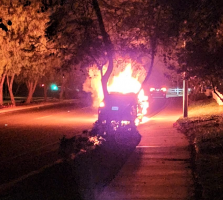— A Ford hybrid engine recall led to a class action lawsuit that was dismissed, followed by another hybrid recall which was followed by another Ford hybrid class action lawsuit.
Ford originally recalled about 100,000 model year 2020-2022 Ford Escape Hybrid, 2021-2022 Lincoln Corsair Hybrid and 2022 Ford Maverick Hybrid vehicles.
At the time Ford told the National Highway Traffic Safety Administration there had been nine hybrid vehicle fiires and a total of 23 thermal incidents.
Ford's engineers believed the hybrid engines suffered from machining problems, and the recall required dealers to drill drainage holes in the under-engine shields and to remove four blinds from the active grille shutters so more air could flow to reduce temperatures.
However, Ford told NHTSA the fire risk was extremely low.
The first Ford hybrid engine class action lawsuit was filed about a month after Ford announced the recall, and the plaintiff who sued said his engine didn't experience any fires. His vehicle was repaired under the recall, but the plaintiff claimed the repairs weren't good enough.
The Ford hybrid class action (Pacheco v. Ford) was dismissed because Ford had already offered to repair the vehicles for free and also offered to reimburse owners for any expenses.
The judge also ruled it was federal safety regulators who were responsible for monitoring the hybrid engine recall.
"Then, as if one unwieldy proceeding is not enough, Plaintiffs rushed in with this case, demanding a cash payout for their initiative to monitor the public Ford-NHTSA communications—and paying no mind to the almost identical Pacheco [lawsuit]." — Ford
Ford argues the judge should stay the class action based on the previous dismissed Pacheco lawsuit and because Ford already recalled the hybrid vehicles.
The automaker says the court should not waste "valuable time and resources" on a class action lawsuit like this.
According to Ford, the plaintiffs apparently believe Ford not only concealed the hybrid engine fire risk, but Ford apparently issued an "expensive and time-consuming recall even though it knew the recall would not resolve the problem."
Ford reminds the judge how the plaintiffs filed their hybrid engine lawsuit just a month after Ford announced the hybrid recall was being expanded, "leaving no room for Ford to complete its analysis and the regulated recall process."
The plaintiffs allegedly should also explain why their claims should not be dismissed when the same claims in the previous lawsuit were dismissed. In addition, Ford argues the two named plaintiffs who sued sold their vehicles before they filed the hybrid engine fire class action lawsuit.
Their vehicles suffered from fires, and Ford says the vehicles were not inspected before the plaintiffs received insurance payouts.
Ford also alleges those two plaintiffs are the only plaintiffs who claim their hybrid engine caused fires.
Ford further argues the plaintiffs filed the hybrid engine recall even though it is federal safety regulators who have the job of monitoring the recall process and repairs.
Ford argues the Ford class action is nothing more than a "tag-along" to the identical dismissed lawsuit Pacheco v. Ford, a class action about the same alleged problem, the same hybrid vehicles and filed by the same lawyers.
The Ford hybrid engine lawsuit was filed in the U.S. District Court for the Eastern District of Michigan: Nishon, et al., v. Ford Motor Company.
The plaintiffs are represented by Hagens Berman Sobol Shapiro LLP, and The Miller Law Firm PC.

